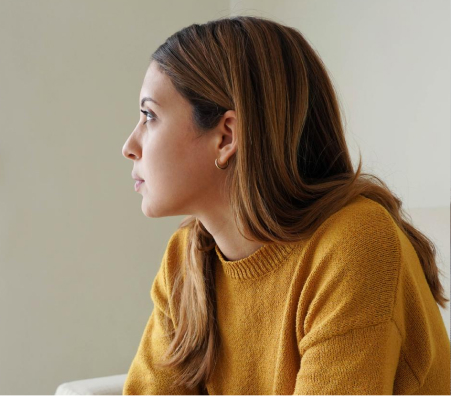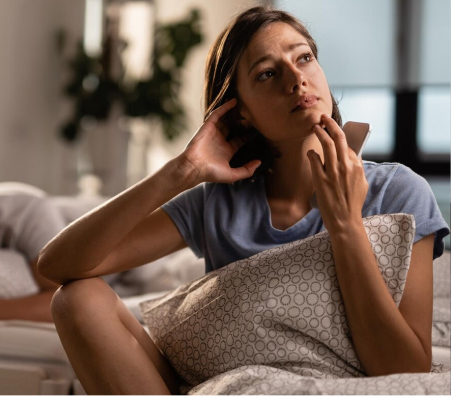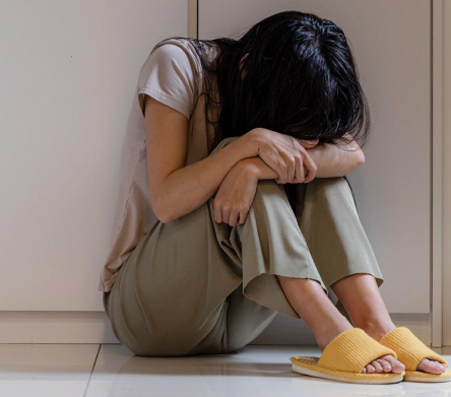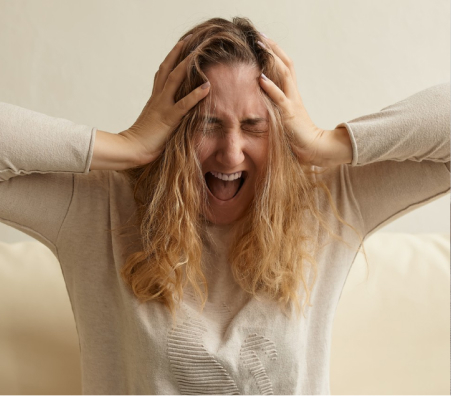The state of your mind is just as important as your physical health. Calming strategies are really helpful when you’re feeling nervous or stressed. These techniques aim to ease your mind, lessen your tension, and improve your overall well-being. Anyone can experience anxiety, and experiencing these feelings occasionally is natural. The good news is that anxiety can be controlled in a variety of ways. We will look at calming techniques for mental health. These calming techniques for anxiety can be used in any setting, be it work or home. Let’s see what you can do next time you feel anxious.
Skip to:
The Impact of Anxiety
Anybody experiences anxiety at some point in their lives; it’s a common emotion. It is a reaction to stress or worry and can vary in severity from mild anxiety to serious concern. However, if anxiety persists or is severe, it can turn into an anxiety disorder and have a significant negative influence on day-to-day functioning.

The symptoms of anxiety disorders are more severe and persistent than those of common anxiety disorders. Excessive anxiety, fear, and situational avoidance may ensue from them. Personal enjoyment in daily life, work, and relationships could all be significantly impacted.
The distinction between a panic attack vs anxiety attack must be made because they are not the same. Panic episodes are characterized by the abrupt onset of strong and frequently overpowering dread. Physical symptoms that typically accompany panic attacks include:
- Dizziness
- Shortness of breath
- Palpitations in the heart
- Chest discomfort
On the other hand, anxiety episodes develop gradually and are associated with the expectation of a particular concern or fear.
Prevalence of Anxiety in Washington
Let’s look at some real numbers to understand how common anxiety really is. A survey by the US Census Bureau gives us a clear picture from a specific timeframe:
- Overall anxiety reports: In Washington, 1.4 million adults said they felt anxiety on all or most days in the first week of February 2022.
- Age matters: If you’re between 18-29 years old, you’re not alone in feeling anxious. About 37% of people in this age group reported frequent symptoms of anxiety. Those aged 30-39 were close behind, with 35% reporting similar feelings. It shows that younger adults are especially feeling the weight of anxiety.
- Gender differences: There’s also a difference between genders. Females reported a higher rate of anxiety symptoms—33%, compared to 21% for males. This suggests that females might experience or report anxiety more frequently than males.

Calming Techniques for Anxiety
Managing anxiety and stress doesn’t have to be complicated. We will explore simple yet effective techniques that can help calm your mind and reduce anxiety levels. Some anxiety calming techniques are:
- Breathing exercises
- Mindfulness and meditation
- Physical activity and nature
How to Calm Down – Breathing Techniques
Breathing exercises are an effective way to reduce anxiety. They assist in calming your nervous system and lowering your heart rate.
One of the calming breathing techniques in breathing deeply through your nose. Breathe in and hold your breath for a few seconds. Then, gently release the breath through your mouth while sitting comfortably. Repeat several times.
Another option is the 4-7-8 calming technique. You need to inhale for four seconds, hold your breath for seven seconds, and then exhale for eight seconds. This rhythm successfully lowers anxiety.
Get Help. Get Better. Get Your Life Back.
Searching for Accredited Dual Diagnosis Mental Health Centers Near You?
Even if therapy failed previously, or are in the middle of a difficult crisis, we stand ready to support you. Our trusted behavioral health specialists will not give up on you. When you feel ready or just want someone to speak to about counseling alternatives to change your life call us. Even if we cannot assist you, we will lead you to wherever you can get support. There is no obligation. Call our hotline today.
FREE 24/7 Dual Diagnosis Mental Health Services HotlineMindfulness and Meditation as Calming Techniques
Meditation and mindfulness are great calming techniques for anxiety. They help you learn to live in the now, which might help you feel less overwhelmed. They help you feel less anxious and stressed. Also, they make it easier for you to focus and block out outside distractions. Find local meditation courses to get started, or use apps and internet tools to help you along the way.
Physical Activity and Nature
There are several advantages of physical activity and outdoor time for mental well-being. First of all, they are great calming techniques for anxiety because they improve mood. Your brain releases endorphins when you do physical exercise. Endorphins are important because they are endogenous analgesics and mood enhancers. Also, frequent exercise helps lessen depressive and anxious feelings.
Washington offers stunning parks, hiking routes, and unspoiled scenery. Trek and explore the nearby trails to get your body moving and connect with nature. Yoga in the park is also an excellent example of calming techniques for anxiety. Practice in a calm outdoor environment with a group or by yourself.

How We Treat Anxiety at We Level Up in Washington
We at We Level Up in Washington are aware that there isn’t a one-size-fits-all approach to anxiety management. We use a holistic approach, integrating various techniques to determine which one is most effective for you. Let’s see how anxiety treatment in Spokane WA will help you recover.
Personalized Therapy
We are convinced of the efficacy of customized treatment. We provide psychotherapy, or “talk therapy,” that is customized to your particular needs and fears because we understand that every person’s experience with anxiety is different. Our therapists collaborate with you to identify the underlying reasons for your anxiety and create plans of action to deal with them.
We employ Cognitive Behavioral Therapy (CBT) as one successful therapeutic approach. CBT teaches you new, healthier ways to react to situations that cause anxiety by assisting you in recognizing and challenging the ideas and actions that fuel your worry. Methods like cognitive therapy and exposure treatment, which help you confront and progressively grow more accustomed to the situations you fear, make this therapy particularly helpful for social anxiety.
End the Emotional Pain. Get Your Life Back.
Feeling Depressed, Anxious or Struggling with Mental Health Illness? Get Safe Comfortable Mental Health Dual Diagnosis High-Quality Therapy From Counselors That Care. Begin Your Recovery Now.
Hotline: (509) 348-4077

Medication Management to Support Calming Techniques
Although medication cannot completely cure anxiety, it can greatly lessen its symptoms. When prescribing drugs, we carefully examine your medical history, present state of health, and individual needs. Here are some options we use:
- Anti-anxiety medications: Although they can rapidly reduce panic and anxiety symptoms, they are usually only advised to be used temporarily due to the possibility of dependence.
- Antidepressants: Frequently prescribed for the long-term treatment of anxiety, antidepressants can enhance the way your brain uses specific chemicals to regulate stress and mood.
- Beta-Blockers: Originally developed to treat high blood pressure, beta-blockers can also be used to treat the physical signs of anxiety, such as trembling and a fast heartbeat.
In order to provide the most efficient and secure course of treatment, we carefully collaborate with you to select the appropriate drug and modify dosages as necessary.

Lifestyle and Support
Realizing that medicine and therapy are merely two of the components of the answer, we also stress the need to modify one’s lifestyle and establish support networks.
Stress management is a critical aspect of anxiety control. Methods like aerobic exercise and meditation can help you feel less anxious, especially when practiced in conjunction with therapy.
We also recommend group therapy. You can talk about your experiences and get advice from people who have gone through similar things, which can encourage one another.
Finally, we give you advice on how to regulate the consumption of substances like caffeine and other over-the-counter medications that may exacerbate anxiety. We can also help you integrate alternative therapies and supplements into your treatment plan.
Specific Anxiety Concerns and Calming Techniques
There are some specific anxiety concerns that need special care. They are:
- Postpartum anxiety
- Performance anxiety
Postpartum Anxiety
Postpartum anxiety disorder is a medical condition that can manifest in a variety of emotional and physical symptoms in new moms. It’s critical to notice these indicators and realize that you’re not experiencing this alone.
Following the birth of your child, there are many postpartum anxiety symptoms that might overwhelm you. They include:
- Overworry: Continually worrying about the well-being and security of your infant, frequently anticipating the worst.
- Racing thoughts: Often unpleasant or upsetting, your mind is constantly racing with ideas that you are unable to stop.
- Physical symptoms: Feeling lightheaded, breathing difficulties, fast heartbeat, headaches, or other symptoms without a known medical cause.
- Sleep disturbances: Having difficulty falling asleep, even while your infant is asleep, which can exacerbate your already high levels of fatigue and anxiety.
- Hyperawareness: You constantly worry about your infant, watching for any little changes or distress signals.

Calming Techniques for Managing Postpartum Anxiety
It takes trial and error to find the ideal strategy for your requirements when it comes to managing postpartum anxiety. The key to treating postpartum anxiety is therapy, and cognitive-behavioral therapy (CBT) is especially helpful. Talking to someone alone won’t cut it; you need to take a proactive strategy that teaches you to recognize the harmful thought patterns that feed your worry and gives you the tools to alter them.
In addition to CBD, therapy sessions frequently include strategies like mindfulness and relaxation exercises to help you better control your anxiety.
Your rehabilitation may also need medication. Postpartum anxiety symptoms are frequently treated with selective serotonin reuptake inhibitors (SSRIs). We’ll take breastfeeding into consideration to make sure the prescription schedule is safe for both you and your child.
Comfortable Facilities & Amenities
High-Quality Mental Health Services & Behaviroal Health Substance Abuse Treatment
Rehab Centers TourRenowned Mental Health Centers. Serene Private Facilities. Inpatient Rehab Programs Vary.
Mental Health Helpline: (509) 348-4077Proven recovery success experience, backed by a Team w/ History of:
15+
Years of Unified Experience
100s
5-Star Reviews Across Our Centers
10K
Recovery Success Stories Across Our Network
- Low Patient to Therapist Ratio
- Comprehensive Dual-Diagnosis Treatment
- Complimentary Family & Alumni Programs
- Coaching, Recovery & Development Events
- Comfortable Onsite Medical Detox Center
By bringing you together with people who genuinely get what you’re going through, group therapy provides a special kind of healing. It offers a secure space for people to talk about their experiences and emotions, which can greatly lessen feelings of isolation and offer comfort.
Lifestyle is another important aspect of postpartum anxiety management. Self-care is essential. Take time to rest, eat healthfully, and move your body. Accepting assistance from reliable friends or family members with baby care is also crucial.
Performance Anxiety
The apprehensive feeling you have right before a public speech or performance is known as performance anxiety. Whether you’re standing on stage, performing in a sporting event, or giving a presentation, it’s quite normal to feel a little nervous before taking the spotlight. Being anxious before these events impacts your thoughts, behaviors, and emotions, making it difficult to be your best self.
Performance anxiety can affect:
- How you act: You may have trouble staying still, become agitated easily, or feel on edge.
- How you think: It gets difficult to focus, your mind races, and occasionally, you can’t get rid of unpleasant or unfavorable thoughts.
- Your general state of mind: Your body may seem as though it is going on overdrive but is also running out of gas when you are sweating but exhausted.

Common symptoms of performance anxiety include:
- Feeling nervous
- Worrying excessively
- Being afraid
- Having trouble falling asleep
- Feeling sick to your stomach
- Racing heart
- Shaking
Calming Techniques for Performance Anxiety
Beating performance anxiety is not easy, but with the right approach and calming techniques, you can manage it effectively. Here’s how:
- Acknowledge your anxiety: Recognize that feeling nervous is common. Changing your perspective on your anxiety and managing it can be achieved by accepting it.
- Plan well: Being well-informed might help you feel more confident. Rehearse your speech or performance until you are comfortable with it
- Challenge negative thinking: Make a positive change in your negative thinking. Change them out for affirmations that uplift you, and constantly remind yourself of your advantages.
- Start small: Take on less daunting circumstances at first, then progressively push yourself further when you’re ready. Every action you take that works lowers your anxiety.
- Self-care: Remember to take care of your general health. Anxiety management is made simpler by leading a healthy lifestyle, which promotes mental wellness.
Mental Health Support in Spokane WA
If you are struggling with depression, anxiety, or substance use disorder (SUD), make sure to look for mental health services in Spokane WA. Here, besides effective calming techniques, you can find many options for inpatient therapy. This is how it will help you:
- Focused support: While you recover in an inpatient environment, a team of experts is there to assist you around the clock. This implies that you receive the prompt assistance you require at any time.
- Dual diagnosis treatment: Our dual diagnosis method takes care of your substance abuse and mental health problems at the same time. Having this integrated treatment ensures that no part of your health is neglected, which is essential for a more effective recovery.
- Family and community involvement: You don’t have to go through recovery alone. We help your family and put you in touch with alumni who have gone through this journey before you.
- Personal growth: Our inpatient program offers workshops and events that center on life skills, business acumen, and recovery tactics, in addition to addressing the present difficulties. It’s about getting you ready for life after recovery and giving you the resources you need to succeed.
Integrating Anxiety Calming Techniques into Daily Life
Practicing calming techniques on a regular basis can significantly improve your mental well-being. Here’s a little how-to to get things done:
- Establish a routine: Choose a time slot every day to engage in activities like deep breathing during breaks or morning meditation. Regularity is essential.
- Start simple: Build up to a few simple practices, such as brief mindfulness exercises or deep breathing, and gradually increase the scope of your practice.
- Use reminders: As a reminder, use sticky notes or your phone to continue your relaxing routine throughout the day.
- Be adaptable: It’s okay that not every day will be ideal. Please feel free to try different approaches if you are having trouble.

Seek Help to Battle Anxiety and Regain Control of Your Life
The secret to managing anxiety is to receive the appropriate treatment in addition to using calming techniques. It’s about figuring out what suits you and incorporating it into your daily routine. Additionally, you have a ton of options and assistance to aid you in this process if you’re in Washington, particularly in the Spokane area. Contact us and take your first step. We are here to guide you, teach you anxiety calming techniques, give you support, and help you stay in control.
World-class, Accredited, 5-Star Reviewed, Effective Mental Health Dual Diagnosis Programs. Complete Integrated Inpatient Rehab with Free Post Discharge Therapy Planning.
Hotline: (509) 348-4077End the Emotional Pain Rollercoaster. Gain Stability & Happiness Through Recovery Treatment. Start Mental Health Counseling Today. Get Free No-obligation Guidance by Behaviroal Health Specialists Who Understand Mental Health Recovery.
Experience Transformative Recovery at the We Level Up Treatment Center.
See our authentic success stories. Get inspired.
Get the help you deserve.



Start a New Life
Begin with a free call to a behavioral health treatment advisor. Learn more about our dual-diagnosis programs. The We Level Up treatment center network delivers recovery programs that vary by each treatment facility. Call to learn more.
- Personalized Care
- Caring Accountable Staff
- World-class Amenities
- Licensed & Accredited
- Renowned w/ 5-Star Reviews
We’ll Call You
Source
Georgoulas-Sherry, Vasiliki PhD. “COVID-19 Behavioral Health Impact Situation Report.” Washington State Department of Health, Washington State Department of Health, Feb. 2022, doh.wa.gov/sites/default/files/2022-03/821-102-BehavioralHealthImpactReport-20220221_1.pdf.





